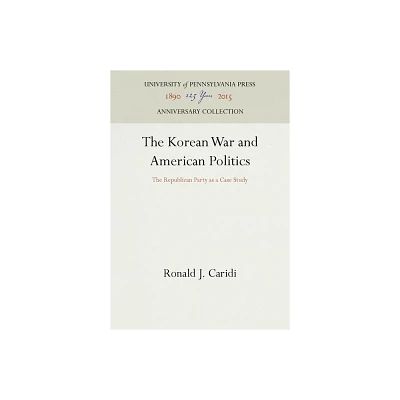Home
Truman, Congress, and Korea: The Politics of America's First Undeclared War
Loading Inventory...
Barnes and Noble
Truman, Congress, and Korea: The Politics of America's First Undeclared War
Current price: $35.00


Barnes and Noble
Truman, Congress, and Korea: The Politics of America's First Undeclared War
Current price: $35.00
Loading Inventory...
Size: Hardcover
*Product Information may vary - to confirm product availability, pricing, and additional information please contact Barnes and Noble
Three days after North Korean premier Kim Il Sung launched a massive military invasion of South Korea on June 24, 1950, President Harry S. Truman responded, dispatching air and naval support to South Korea. Initially, Congress cheered his swift action; but, when China entered the war to aid North Korea, the president and many legislators became concerned that the conflict would escalate into another world war, and the United States agreed to a truce in 1953. The lack of a decisive victory caused the Korean War to quickly recede from public attention. However, its impact on subsequent American foreign policy was profound.
In
Truman, Congress, and Korea: The Politics of America's First Undeclared War
, Larry Blomstedt provides the first in-depth domestic political history of the conflict, from the initial military mobilization, to Congress's failed attempts to broker a cease-fire, to the political fallout in the 1952 election. During the war, President Truman faced challenges from both Democratic and Republican legislators, whose initial support quickly collapsed into bitter and often public infighting. For his part, Truman dedicated inadequate attention to relationships on Capitol Hill early in his term and also declined to require a formal declaration of war from Congress, advancing the shift toward greater executive power in foreign policy.
The Korean conflict ended the brief period of bipartisanship in foreign policy that began during World War II. It also introduced Americans to the concept of limited war, which contrasted sharply with the practice of requiring unconditional surrenders in previous conflicts. Blomstedt's study explores the changes wrought during this critical period and the ways in which the war influenced US international relations and military interventions during the Cold War and beyond.
In
Truman, Congress, and Korea: The Politics of America's First Undeclared War
, Larry Blomstedt provides the first in-depth domestic political history of the conflict, from the initial military mobilization, to Congress's failed attempts to broker a cease-fire, to the political fallout in the 1952 election. During the war, President Truman faced challenges from both Democratic and Republican legislators, whose initial support quickly collapsed into bitter and often public infighting. For his part, Truman dedicated inadequate attention to relationships on Capitol Hill early in his term and also declined to require a formal declaration of war from Congress, advancing the shift toward greater executive power in foreign policy.
The Korean conflict ended the brief period of bipartisanship in foreign policy that began during World War II. It also introduced Americans to the concept of limited war, which contrasted sharply with the practice of requiring unconditional surrenders in previous conflicts. Blomstedt's study explores the changes wrought during this critical period and the ways in which the war influenced US international relations and military interventions during the Cold War and beyond.


















